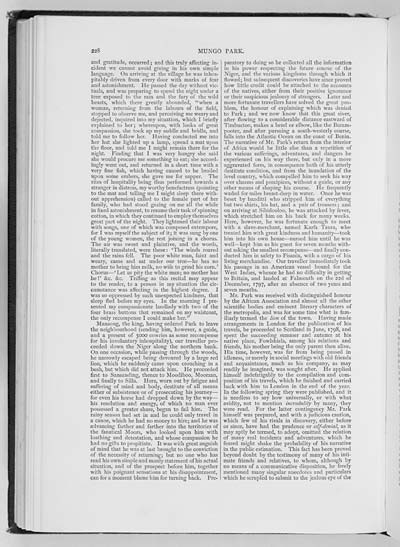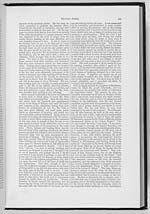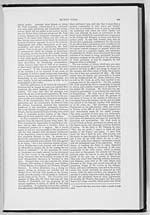228
and gratitude, occurred; and this truly affecting in-
cident we cannot avoid giving in his own simple
language. On arriving at the village he was inhos-
pitably driven from every door with marks of fear
and astonishment. He passed the day without vic-
tuals, and was preparing to spend the night under a
tree exposed to the rain and the fury of the wild
beasts, which there greatly abounded, "when a
woman, returning from the labours of the field,
stopped to observe me, and perceiving me weary and
dejected, inquired into my situation, which I briefly
explained to her; whereupon, with looks of great
compassion, she took up my saddle and bridle, and
told me to follow her. Having conducted me into
her hut she lighted up a lamp, spread a mat upon
the floor, and told me I might remain there for the
night. Finding that I was very hungry she said
she would procure me something to eat; she accord-
ingly went out, and returned in a short time with a
very fine fish, which having caused to be broiled
upon some embers, she gave me for supper. The
rites of hospitality being thus performed towards a
stranger in distress, my worthy benefactress (pointing
to the mat and telling me I might sleep there with-
out apprehension) called to the female part of her
family, who had stood gazing on me all the while
in fixed astonishment, to resume their task of spinning
cotton, in which they continued to employ themselves
great part of the night. They lightened their labour
with songs, one of which was composed extempore,
for I was myself the subject of it; it was sung by one
of the young women, the rest joining in a chorus.
The air was sweet and plaintive, and the words,
literally translated, were these: 'The winds roared
and the rains fell. The poor white man, faint and
weary, came and sat under our tree�he has no
mother to bring him milk, no wife to grind his corn.'
Chorus�'Let us pity the white man; no mother has
he!' &c. &c. Trifling as this recital may appear
to the reader, to a person in my situation the cir-
cumstance was affecting in the highest degree. I
was so oppressed by such unexpected kindness, that
sleep fled before my eyes. In the morning I pre-
sented my compassionate landlady with two of the
four brass buttons that remained on my waistcoat,
the only recompense I could make her."
Mansong, the king, having ordered Park to leave
the neighbourhood (sending him, however, a guide,
and a present of 5000 cowries as some recompense
for his involuntary inhospitality), our traveller pro-
ceeded down the Niger along the northern bank.
On one occasion, while passing through the woods,
he narrowly escaped being devoured by a large red
lion, which he suddenly came upon crouching in a
bush, but which did not attack him. He proceeded
first to Sansanding, thence to Moodiboo, Moorzan,
and finally to Silla. Here, worn out by fatigue and
suffering of mind and body, destitute of all means
either of subsistence or of prosecuting his journey�
for even his horse had dropped down by the way�
his resolution and energy, of which no man ever
possessed a greater share, began to fail him. The
rainy season had set in and he could only travel in
a canoe, which he had no money to hire; and he was
advancing farther and farther into the territories of
the fanatical Moors, who looked upon him with
loathing and detestation, and whose compassion he
had no gifts to propitiate. It was with great anguish
of mind that he was at last brought to the conviction
of the necessity of returning; but no one who has
read his own simple and manly statement of his actual
situation, and of the prospect before him, together
with his poignant sensations at his disappointment,
can for a moment blame him for turning back. Pre-
paratory to doing so he collected all the information
in his power respecting the future course of the
Niger, and the various kingdoms through which it
flowed; but subsequent discoveries have since proved
how little credit could be attached to the accounts
of the natives, either from their positive ignorance
or their suspicious jealousy of strangers. Later and
more fortunate travellers have solved the great pro-
blem, the honour of explaining which was denied
to Park; and we now know that this great river,
after flowing to a considerable distance eastward of
Timbuctoo, makes a bend or elbow, like the Buram-
pooter, and after pursuing a south-westerly course,
falls into the Atlantic Ocean on the coast of Benin.
The narrative of Mr. Park's return from the interior
of Africa would be little else than a repetition of
the various sufferings, adventures, and dangers he
experienced on his way there, but only in a more
aggravated form, in consequence both of his utterly
destitute condition, and from the inundation of the
level country, which compelled him to seek his way
over chasms and precipices, without a guide, or any
other means of shaping his course. He frequently
waded for miles breast-deep in water. Once he was
beset by banditti who stripped him of everything
but two shirts, his hat, and a pair of trousers; and
on arriving at Sibidooloo, he was attacked by fever,
which stretched him on his back for many weeks.
Here, however, he was fortunate enough to meet
with a slave-merchant, named Karfa Taura, who
treated him with great kindness and humanity�took
him into his own house�nursed him until he was
well�kept him as his guest for seven months with-
out asking the smallest recompense�and finally con-
ducted him in safety to Pisania, with a cargo of his
living merchandise. Our traveller immediately took
his passage in an American vessel bound for the
West Indies, whence he had no difficulty in getting
to Britain, and landed at Falmouth on the 22d of
December, 1797, after an absence of two years and
seven months.
Mr. Park was received with distinguished honour
by the African Association and almost all the other
scientific bodies and eminent literary characters of
the metropolis, and was for some time what is fam-
iliarly termed the lion of the town. Having made
arrangements in London for the publication of his
travels, he proceeded to Scotland in June, 1798, and
spent the succeeding summer and autumn at his
native place, Fowlshiels, among his relations and
friends, his mother being the only parent then alive.
His time, however, was far from being passed in
idleness, or merely in social meetings with old friends
and acquaintance, much as his company, as may
readily be imagined, was sought after. He applied
himself indefatigably to the compilation and com-
position of his travels, which he finished and carried
back with him to London in the end of the year.
In the following spring they were published, and it
is needless to say how universally, or with what
avidity, not to mention incredttlity by many, they
were read. For the latter contingency Mr. Park
himself was prepared, and with a judicious caution,
which few of his rivals in discovery, either before
or since, have had the prudence or self-denial, as it
may aptly be termed, to adopt, omitted the relation
of many real incidents and adventures, which he
feared might shake the probability of his narrative
in the public estimation. This fact has been proved
beyond doubt by the testimony of many of his inti-
mate friends and relatives, to whom, although by
no means of a communicative disposition, he freely
mentioned many singular anecdotes and particulars
which he scrupled to submit to the jealous eye of the

![]() Universal Viewer |
Universal Viewer | ![]() Mirador |
Large image | Transcription
Mirador |
Large image | Transcription
![]()

